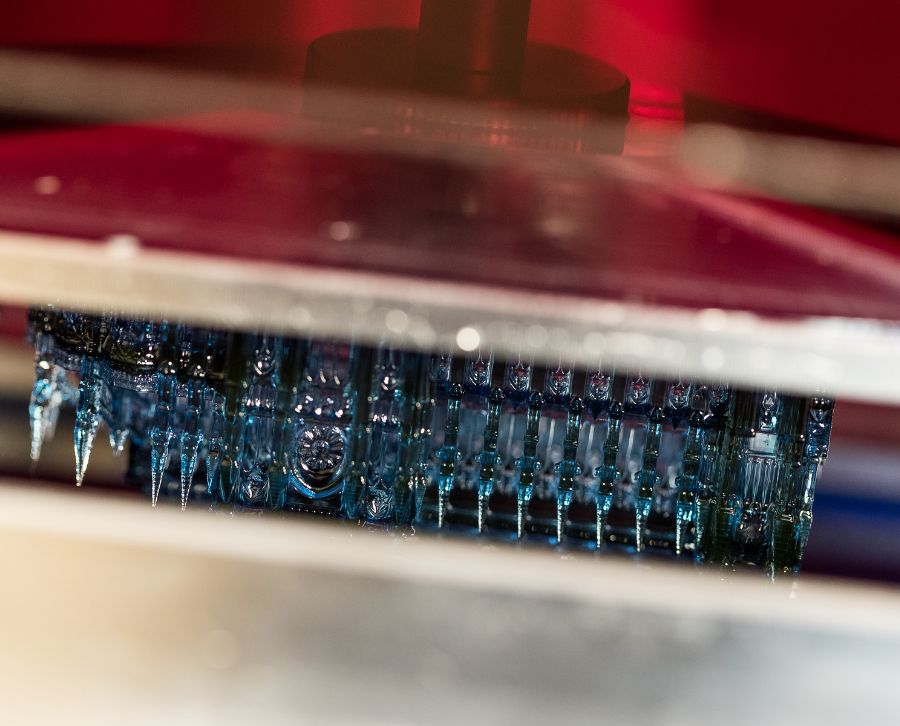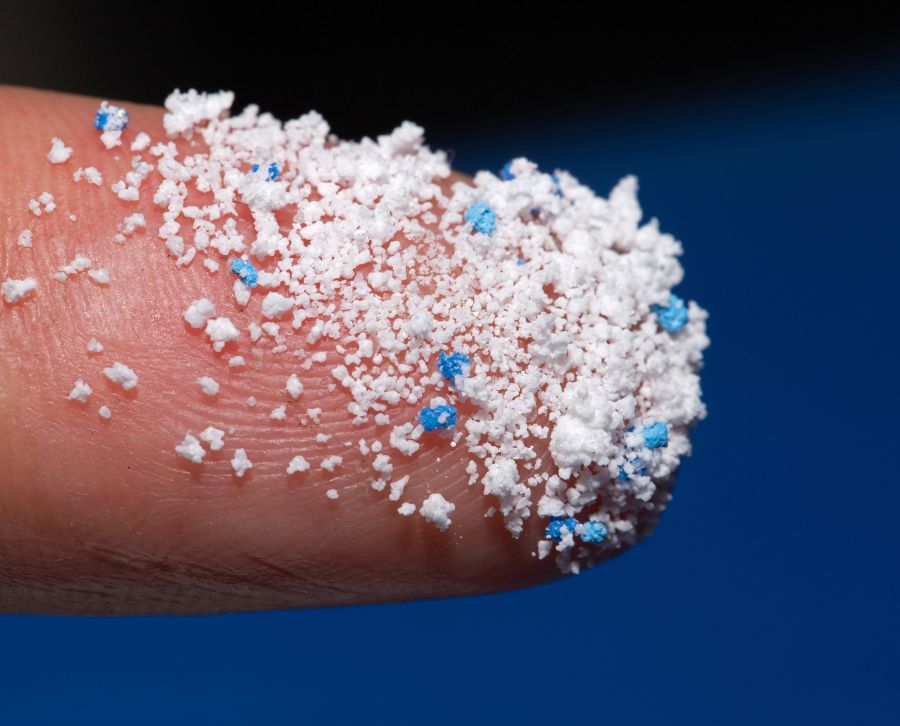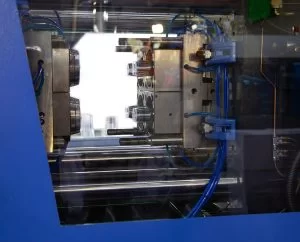The processes used to change the shape of materials involve the use of mechanical or thermal forces to deform them into the desired shape.
In the case of plastics, transformation processes usually involve heating the material to a semi-liquid state, and applying a force to mould it. This process can be controlled with great precision, making it ideal for the creation of parts and components with specific shapes.
Methods for transforming plastics are fundamental to many industries, from manufacturing to construction, and have led to major advances in design and functionality in the world we live in.

Introduction to plastics and their versatility
The world of plastics is huge and diverse. They are created by polymerisation, a process by which monomers, which are the raw materials of plastics, are joined together to form polymers.
The monomers most commonly used to create plastics, ethylene and propylene, are obtained from petroleum through industrial processes in petrochemical complexes.
Types of plastics and their unique properties
There are several types of plastics, each with different properties and uses, these are some of the best known and most commonly used in industry:
- PET (Polyethylene Terephthalate) is transparent, tough and lightweight, used in water bottles and other beverages.
- PE (Polyethylene) has two types depending on its density, HDPE which is harder, used for lids and pipes; and LDPE which is more flexible, used in bags and wrapping.
- PP (Polypropylene) is heat and chemical resistant and is used for food packaging and kitchenware.
- PS (Polystyrene) is lightweight and chemical resistant, used for disposable packaging.
- PVC (Polyvinyl Chloride) is hard and tough, used for pipes, windows and vinyl flooring.
- Finally, polyurethane is a thermal insulator and impact resistant, used in thermal insulation and mattresses.

Importance of plastics in modern industry
Since the creation of the first plastic in 1860 in the United States, this cheap, light and strong material has transformed virtually every modern industry.
The plastics revolution brought about an incredible reduction in production cost of many objects and tools. It is a particularly important material for the medical, food, construction, automotive and other industries.
Plastic transformation processes
There are several processes for transforming plastic, each has its advantages and disadvantages and the choice of one type over another will depend on the desired results.
The moulds manufacturing is a complementary and necessary process for the transformation of various plastics.
Extrusion: shaping plastics through heat and pressure
Extrusion of plastics is an industrial process in which a type of polymer (thermoplastics, elastomers or thermosets) is melted and moulded under constant pressure to obtain the desired shape.
It is used for the manufacturing of a wide variety of plastic products such as pipes, various types of parts, films, profiles, etc. It is a process that offers great versatility.
Injection moulding: precise and efficient manufacturing of plastic parts
In injection moulding, various types of molten plastic can be injected into a mould to create complex shapes with high precision and efficiency.
This process can be used to create toys, tools, packaging and other types of parts.
Thermoforming: Creating products with heat and moulding
Thermoforming involves heating a sheet of plastic until it softens and then forming it into a specific shape using a mould. At the end of the process, it is cooled to maintain its shape.
This process is used to produce boxes, car parts, trays, packaging and others.
Rotational moulding: production of hollow objects by rotation
Rotomoulding or rotational moulding is a manufacturing process for creating hollow plastic parts. It works by heating plastic in a liquid state and then rotating a mould around multiple axes to evenly distribute the molten plastic throughout the walls of the mould
It is used to make large, complex one-piece parts, such as water tanks, buckets, chairs, etc.
Blow moulding processes: moulding plastics by compressed air
Blow moulding is a process, similar to glass blowing, for creating hollow plastic parts. It works by injecting a thermoplastic into a mould and blowing air into the molten part to expand it against the mould walls.
It is used to make items such as bottles, containers, hollow pipes, etc.
Technological advances in plastics processing
The plastics industry has experienced major technological advances such as the development of biodegradable, lightweight, resistant plastics with improved properties and from renewable materials, reducing dependence on oil.
Other important advances have been in material transformation, such as additive manufacturing of plastics, also known as 3D printing, and other advanced moulding technologies.
Additive manufacturing (3D printing) of plastic parts
3D printing has been a major revolution in the production of plastic parts, enabling the manufacturing of components with complex, high-precision geometries that would be difficult or impossible to produce using traditional methods.
This additive manufacturing process involves creating three-dimensional objects from digital models by bonding thin layers of material together.
Advanced moulding technologies for greater precision and complexity
Advanced moulding technologies use composite materials to create complex parts with superior properties. Examples include fibre injection moulding, compression moulding, resin transfer moulding and resin infusion moulding.
These technologies offer benefits such as reduced weight, increased strength, greater flexibility and greater efficiency in the manufacture of complex parts.
Plastics Recycling and Reuse Processes
Plastics recycling consists of three stages: mechanical recycling, molding and finishing.
In mechanical recycling, plastic waste is separated, crushed and cleaned. In the molding stage, the cleaned plastic scraps are melted and molded into new products, and in the finishing stage, additional characteristics can be added to them.
The reuse of plastics is a process for creating new products from plastic waste, and can be done in a number of different ways. It also has a number of benefits for society and the environment.
Challenges and opportunities in plastics processing
Since the awareness of the limitation of natural resources related to the manufacture of plastics, as well as the environmental problem posed by the accumulation of non-biodegradable plastics in nature, a number of challenges have arisen. Fortunately, important steps have been taken in recent years to overcome them.
Innovations in biodegradable and compostable materials
Innovations in biodegradable and compostable materials are providing new solutions to reduce the impact of plastic waste.
These materials, which break down naturally, can help reduce the amount of plastic waste that ends up in landfills and in the environment.
Sustainability and circular economy in the plastics industry
Circular economy refers to a system in which materials and products are continuously reused and recycled, minimizing waste and the use of new resources. This can help decrease ecological impact and improve sustainability.
Regulations and standards to promote responsible plastics management
These new policies can establish regulations for the production and disposal of plastics, promote the use of recycled materials, and encourage innovation in the manufacture of more sustainable materials.
Future of plastics processing
Given the great interest in the improvement of polymer transformation processes, the future looks bright for this industry.
Trends in the development of stronger and lighter plastics
The development of stronger and lighter plastics is an important trend in the plastics industry. These materials can improve the performance and efficiency of a wide range of products, from packaging to vehicles to construction materials.
Research into new, more eco-friendly plastic materials
These plastics made from materials such as vegetable starch or cellulose may have a lower environmental impact in their production and disposal, and some may even be biodegradable or compostable.
Impact of artificial intelligence and automation on the plastics industry
Artificial intelligence (AI) is being used to improve the production and efficiency of plastics, develop new types of lighter, stronger and more environmentally friendly plastics, and improve plastics recycling by using intelligent robots to sort waste.





 by
by